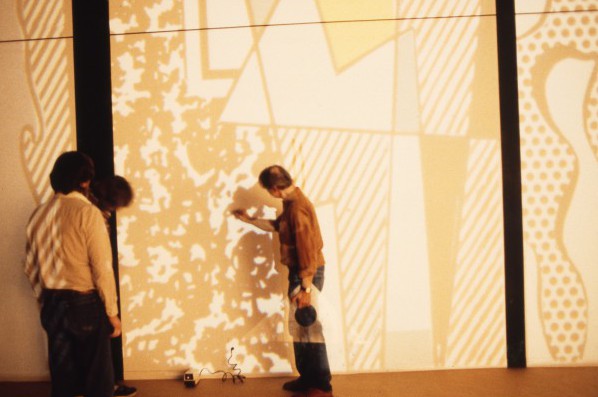
In December 1983 at the Leo Castelli Gallery on Greene Street, Roy Lichtenstein painted a mural that remixed imagery from some of his most iconic paintings. Weeks later, the creation was destroyed to make room for another exhibition, and all that remains of the project are a few photographs, a blueprint, and a handful of studies.
While the work may have been intended to be lost to time, on September 10, the mural will come alive for a brief period once again to a new generation of New Yorkers thanks to former studio assistant Rob McKeever. Greene Street Mural—as the 2015 iteration is called—is a bold compilation of Lichtenstein’s modular paintings, Art Deco inspirations, pyramids, composition books, and picture frames.
“He was moving into the city from his studio in Southampton, and I knew he needed an assistant,” McKeever, who began work in Lichtenstein’s studio a few months prior to the creation of the original mural and remained with the artist until his death 14 years later in 1997, told artnet News. “When he finally hired me, [the mural] was the first job that we worked on.”
Roy Lichtenstein’s Greene Street Mural, 1983, installed at Leo Castelli Gallery, 142 Greene Street, New York, December 3, 1983–January 14, 1984.
© Estate of Roy Lichtenstein. Courtesy Castelli Gallery and Gagosian Gallery.
Unlike the original, which was painted by McKeever, Lichtenstein, Leo Castelli, Lichtenstein’s wife Dorothy and two other studio members using a massive projection, the 2015 version was not produced by artists, but by commercial sign painters. “I think they wanted to make it clear that it is a copy,” McKeever said. “Roy drew out the original body himself, so for us to try to do that is not really the same thing…. We wanted to just make it a faithful reproduction.”
In the role of supervisor to the new mural, McKeever has been responsible for ensuring that the painters get the colors just right, and that “the mechanics are the same way Roy would want them to be done.”
“The stripes have to be the same way he did them, and the dots,” said McKeever. “When you’re trying to imitate his work, that’s the biggest factor.”
Lichtenstein was adamant about hand painting as much of his own work as possible. Amazingly, given how prolific he was, he only maintained one assistant in each of his studios—a far cry from some of the most successful artists today who maintain staff in the double digits.
ROY LICHTENSTEIN
Drawing study for Greene Street Mural, 1983
Graphite and colored pencils on paper
9 x 42 1/2 inches (23 x 108 cm)
© Estate of Roy Lichtenstein. Courtesy Gagosian Gallery.
Indeed, the Greene Street Mural harkens back to an era of the New York art world that was simpler and grittier. McKeever recalls that, almost every day, he and Lichtenstein and whoever else they were with would lunch at the beloved, now-defunct Meatpacking District diner Florent. “That’s actually how I met Larry,” McKeever said with a laugh referring to art dealer Larry Gagosian, for whose gallery he is currently head archivist and photographer.
McKeever described Lichtenstein as “very sweet, never angry, very easy to work with.” Of course, not all of the artists he encountered during his tenure as an assistant were quite as down-to-earth.
“One of my most interesting encounters with an artist was actually before I met Roy, and it was with Andy Warhol,” McKeever recalled. “I was working for [photographer] Martha Swope at the time, and she was [doing photographs for a two-person show]…and Andy had been hired by the publicist to do a poster for it. Andy came to the gallery, and the press agent was there, and Martha had to go answer her phone. So he just stepped up, took about six or seven pictures of the two guys, and left. Never said a word to anyone.”
ROY LICHTENSTEIN
Final study for Greene Street Mural, 1983
Cut-and-pasted printed and painted paper, india ink, gouache, pencil and synthetic polymer paint on paper
17 x 56 1/8 inches (43.2 x 143 cm)
The Museum of Modern Art, New York, NY U.S.A.
© Estate of Roy Lichtenstein. Digital Image © The Museum of Modern Art/Licensed by SCALA / Art Resource, NY. Courtesy Gagosian Gallery.
Roy Lichtenstein: Greene Street Mural will be on display at Gagosian Gallery at 555 West 24th Street from September 10–October 17, 2015.
Related stories:
Sotheby’s To Offer Pristine Roy Lichtenstein Painting for $50 Million
The Art Money 20: Which Artists Have Performed Best at Auction Since 1995?
What Are the 10 Best Works of Art in New York Museums? Let the Debate Begin
8 Secrets to Larry Gagosian’s Success Revealed